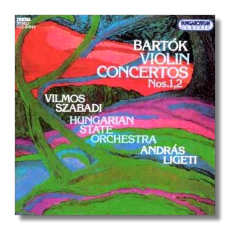
The Internet's Premier Classical Music Source
Related Links
- Bartók Reviews
- Latest Reviews
- More Reviews
-
By Composer
-
Collections
DVD & Blu-ray
Books
Concert Reviews
Articles/Interviews
Software
Audio
Search Amazon
Recommended Links
Site News
 CD Review
CD Review
Béla Bartók

Violin Concertos
- Violin Concerto #1, Sz 36 (1908)
- Violin Concerto #2, Sz 112 (1938)
Vilmos Szabadi, violin
Hungarian State Orchestra/Andras Ligeti
Hungaroton White Label 31543 - 57min
There is no doubt that young Vilmos Szabadi has a formidable technique. His awards from the Hungarian Radio National Competition (1982), the Jenő Hubay Violin Competition in Budapest (1983), and the Jean Sibelius Violin Competition (1985) all attest to that. In addition, he brings to these two masterpieces a rich, golden tone and an uncanny ability to maintain the purity of that tone no matter how complex or demanding the solo writing becomes. Szabadi is at his most persuasive in Bartók's quieter, more reflective moments, such as the hushed, lyrical beginning of Concerto 1, which this violinist treats as one unbroken four and one-half minute outburst. However, Midori's stately tempo and intense concentration (Sony) reveals even more of the haunting beauty of this music. And while II of Concerto 2 is appropriately tranquil in Szabadi's hands, Midori somehow finds the mystery and tension that he glosses over. For Kyung Wha Chung this theme with variations represents the emotional core of the concerto, and in her resplendent new EMI recording it becomes a uniquely touching and powerful utterance. Szabadi plays the remainder of both concertos in a routine, uninvolved, and occasionally lethargic manner that does nothing to threaten the supremacy of either Chung or Midori.
Hungaroton's sound is boxy, and the orchestra is placed well behind the soloist. Ligeti's conducting is very nearly as bland and humorless as Szabadi's fiddling – as the lackluster conclusion of Concerto 1 demonstrates. The Hungarian State Orchestra plays tolerably well in spite of its threadbare strings, but they are no match for Simon Rattle's feisty Birmingham orchestra (with Chung on EMI).
Copyright © 1998, Tom Godell
















